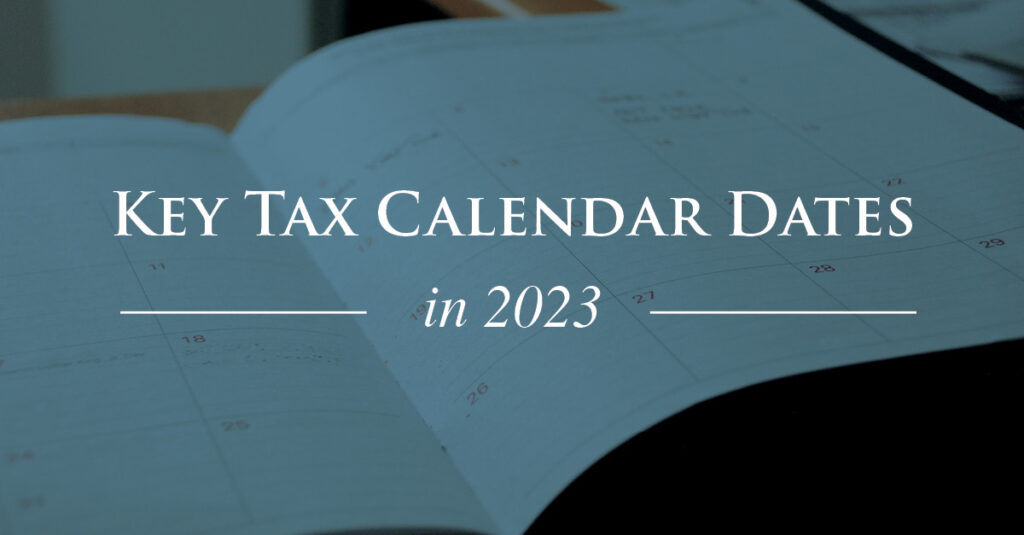
The dawn of a new year often inspires individuals and businesses to take a wide-lens view of their financial situation. This exercise may facilitate goal setting, and adjustments to current approaches, and may also inspire questions about tax strategy.
As the tax implications of major financial decisions must be carefully considered, it’s important to keep one eye on your calendar as you engage in your annual “new year” assessment of your finances. If you miss important tax deadlines, your finances could suffer significantly.
In this article, the reputable CPAs at Ferguson Timar detail key tax dates for 2023 that you’ll want to mark on your calendars right away. Being as proactive as you can as these dates approach will better ensure the minimization of your tax liability and the overall success of your financial situation this year.
Filing Dates for 2022 Tax Returns
Although most Americans think of Tax Day as the “Ides of April” (April 15), Tax Day will be observed on April 18, 2023. Tax Day was moved this year due to a conflict with the Emancipation Day holiday observed by Washington, D.C. This means that you have a few extra days to file your taxes than you likely expected.
If your tax return isn’t ready to be filed on April 18, you can request an extension until October 16. Note, however, that any outstanding payments that you are liable to pay for the 2022 tax year remain due on April 18. First-quarter estimated payments for businesses are also due on Tax Day. Second-quarter estimated payments are due by September 15.
The other two dates that individuals should be aware of before Tax Day rolls around are January 17 and February 15. Individuals who are exempt from withholding taxes need to submit their recertification Form W-4 by February 15. For taxes that aren’t withheld, estimated payments for taxes on earnings from quarter four of 2022 are due January 17.
If you are a U.S. resident who is currently living outside the U.S. and Puerto Rico, your taxes are due on June 15.
Inflationary Adjustments for 2023
More than 60 provisions of the U.S. Tax Code are affected by 2023 inflationary adjustments. For example, the standard deduction has increased, as have marginal rates for individuals who make less than $578,125.
Of particular note to many individuals and businesses are the adjustments being made to qualified retirement plans and accounts. Individual contribution rates to 401(K)s and IRAs are both up in 2023, as are the limits for some catch-up contributions and SIMPLE retirement accounts.
These adjustments should inspire even more taxpayers to stay on top of their tax calendars this year. Minimizing liability and maximizing benefits are excellent reasons to file early and to file in informed ways.
Employee Retention Credit Filing Deadline
The 2020 CARES Act introduced the Employee Retention Credit (ERC) tax benefit for qualifying employers. To motivate employers to keep workers on their payrolls during the worst of the Covid-19 pandemic, Congress authorized significant tax refunds for employers that met the criteria outlined in CARES and modified by the 2021 Relief Act.
If your business employed fewer than 501 employees during Q2, Q3, or Q4 of 2020 or any/all of 2021, your company may be eligible for significant tax benefits. Note that receiving PPP loans that were forgiven does not invalidate your company’s ERC eligibility.
Although businesses can technically claim their ERC credits for 2020 until April 15, 2024 – and their 2021 ERC credits until April 15, 2025 – you’ll want to proactively meet with our team before “Tax Day” on April 18, 2023. We will assess your eligibility and begin preparing mandatory documentation so that you can receive your funds sooner rather than later. No one knows what the future of the economy will look like for the remainder of the year. But receiving a refund of up to $26,000 per qualifying employee could help to shore up your company’s finances now.
Ferguson Timar Can Keep Your Taxes on Track in 2023
Connect with the knowledgeable CPAs at Ferguson Timar today to begin crafting your tax strategy for the 2022 tax year and beyond. We have extensive experience managing the tax strategies of Orange County residents and businesses alike. By embracing a proactive approach to tax planning now, your finances could benefit well into the future. To learn more about our CPA and tax planning services, connect with our team today. We look forward to speaking with you.
